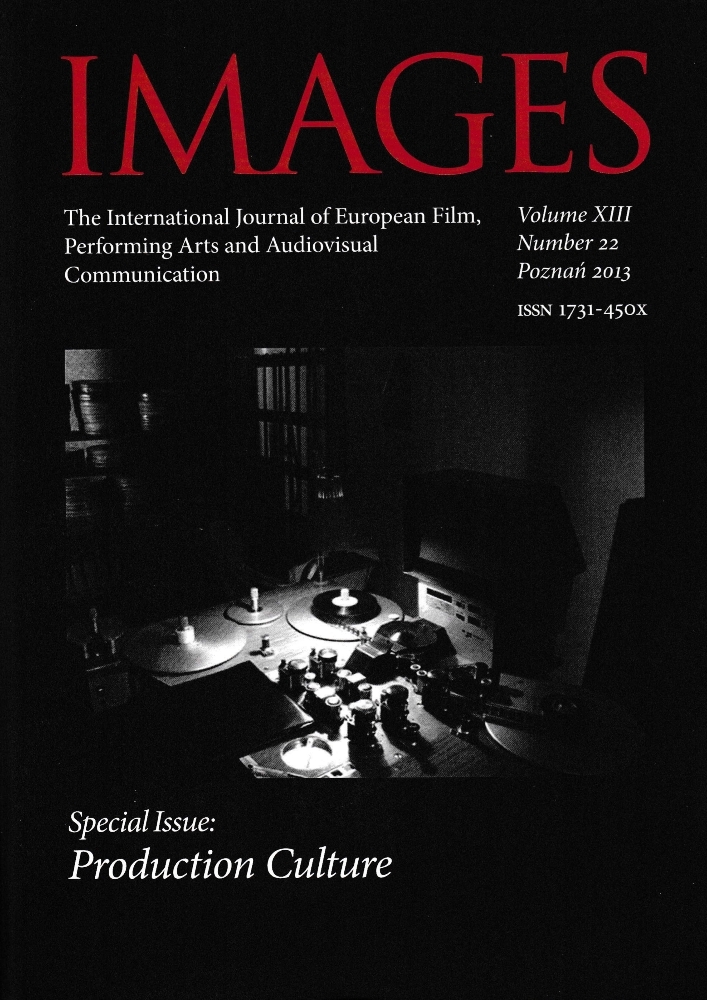Abstract
The aim of the article is to outline the key issues surrounding legal notions of film authorship. For scholars interested in studying the process of production it is extremely important to analyze the status and scope of power of its participants as well as their position in the hierarchy – one of the main sources of priveleges is the fact of being recognized by the law as the author of the work produced. The article depicts the benefits of such situation, but its main aim is to descibe the legal rules of granting the status of the author. Outlined are the issues emerged from the two radically different legal system – european droit d`auteur tradition and american copyright. The first one honours the artists while the other focuses mostly on providing the certainty of the economics, so the actual authors of the work are not that important. The paper points to the fact that – especially in the case of american copyright – the actual (determined by law) situation of a creator may differ significantly from the character of their contribution to the process of producing a film. Analysis of the rules and principles of the law is essential to the understanding of the structural determinants of film production and deserves no less attention than social, political and economic factors.References
D. Hesmondhalgh, Media industry studies, media production studies, w: Media and Society, ed. J. Curran, Bloomsbury Academic, London–New York 2010, s. 4.
M. Stahl, Privilege and Distinction in Production Worlds: Copyright, Collective Bargaining, and Working Conditions in Media Making, w: Production Studies: Cultural Studies of Media Industries, eds. V. Mayer, M.J. Banks, J.T. Caldwell, Routledge, New York 2009, s. 54.
P. Goldstein, Copyright Highway, Hill and Wang, New York 1994, s. 168.
A. Wojciechowska, Autorskie prawa osobiste twórców dzieła audiowizualnego, UJ, Kraków 1999, s. 20–23.
Ustawa z dnia 4 lutego 1994 r. o prawie autorskim i prawach pokrewnych (Dz.U. z 1994 r. Nr 24 poz. 83 z późn. zm.).
E. Traple, Autorskie prawa majątkowe, w: System prawa prywatnego, t. 13: System prawa prywatnego. Prawo autorskie, red. J. Barta, Wydawnictwo C.H. Beck, Instytut Nauk Prawnych PAN, Warszawa 2003, s. 121.
A. Wojciechowska, Uwagi o pierwotnym podmiocie praw autorskich do filmu, w: Spory o własność intelektualną. Księga jubileuszowa dedykowana Profesorom Januszowi Barcie i Ryszardowi Markiewiczowi, red. A. Matlak i S. Stanisławska-Kloc, Wolters Kluwer Polska, Warszawa 2013, s. 14-53.
M. Salokannel, Film Authorship and the Audio-visual Environment, w: Of Authors and Origins, eds. B. Sherman i A. Strowel, Clarendon Press, Oxford 1994, s. 57–58.
L. Zemer, The Idea of Authorship in Copyright, Ashgate, Aldershot 2007, s. 74.
J. Stillinger, Multiple Authorship and the Myth of Solitary Genius, Oxford University Press, New York 1991, s. 68.
R.J. Coombe, Cultural Life of Intellectual Properties, Duke University Press, Durham, London 1998, s. 211.
P. Kamina, Film Copyright in the European Union, Cambridge University Press, Cambridge 2004, s. 156.
J. Barta, R. Markiewicz, Przedmiot prawa autorskiego, w: Prawo autorskie i prawa pokrewne. Komentarz, red. J. Barta, R. Markiewicz, Dom Wydawniczy ABC, Warszawa 2003, s. 59.
E.I. Obergfell, No need for harmonizing f lm copyright in Europe?, „The European Legal Forum” 2003, wyd. 4, s. 199.
M. Salokannel, Cinema in Search of its Authors, w: Film and Authorship, ed. V.W. Wexman, New Jersey 2003, s. 163.
Dziennik Urzędowy Unii Europejskiej L 290.
Art. L.113–7, Kodeks Własności Intelektualnej z 1 lipca 1992 r. [online], http://www.wipo.int/wipolex/en/details.jsp?id=5563 [dostęp: 10 września 2013].
Art. 87, Ustawa z 12 marca 1996 r. [online], http://www.wipo.int/wipolex/en/details.jsp?id=1358 [dostęp: 10 września 2013].
Ustawa o prawie autorskim i prawach po-krewnych z 16 lipca 1988 r. (szczególnie art. 7 i 8) [online], http://www.wipo.int/wipolex/en/details.jsp?id=1034 [dostęp: 10 września 2013].
J.T. Caldwell, Production Culture: Industrial Reflexivity and Critical Practice in Film and Television, Duke University Press Books, Durham 2008, s. 198.
A.M. Niżankowska, Prawo do integralności utworu, Wolters Kluwer Polska, Warszawa–Kraków 2007, s. 82.
A. Wojciechowska, Barwienie czarno¬-białych filmów w świetle prawa autorskiego, „Prace z Wynalazczości i Ochrony Własności Intelektualnej” 1992, z. 58, s. 55.
M. Adamczak, Globalne Hollywood, filmowa Europa i polskie kino po 1989 roku, Wydawnictwo słowo/ obraz terytoria, Gdańsk 2010, s. 29.
Paul Smith v. Edward L. Montoro and Film Ventures International Inc, 648 F.2d 602 (9th Cir. 1981).
T. Caldwell, Screen studies and industrial „the authorizing”, „Screen” 2009, vol. 50, Issue, s. 179.
License
Copyright
© by Adam Mickiewicz University, Poznań, 2013
OPEN ACCESS
